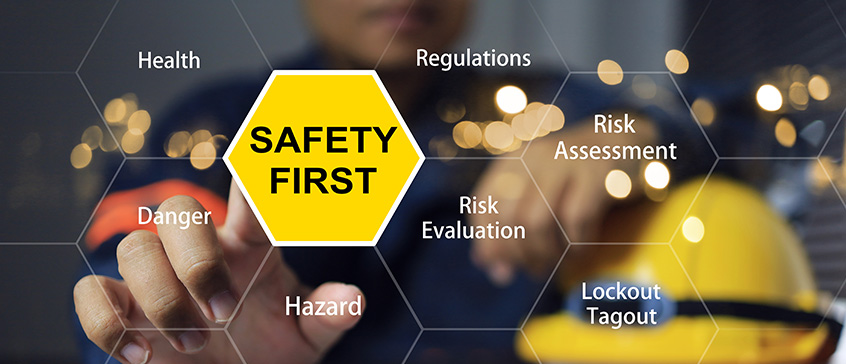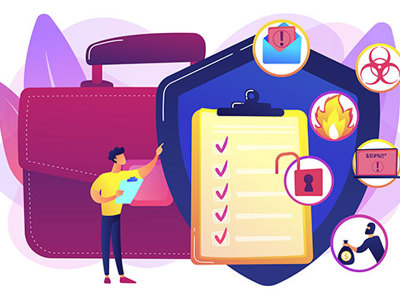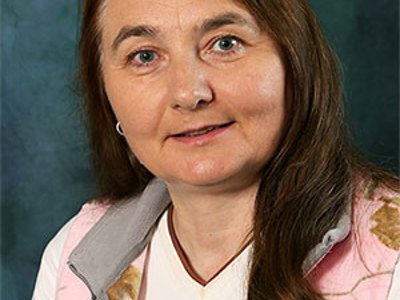
Help workplaces stay safe and resilient in a crisis
Incidents like workplace accidents, chemical spills and business disruptions happen every day. Health, Safety and Emergency Management professionals work to recognize and prevent potential problems before they occur. Amid ongoing global, national and regional emergencies—from pandemics and wars to cyber-attacks and natural disasters—the importance of worker safety, business continuity planning and risk management is on the rise. Continuing Studies at UVic is here to help. We train staff at every level to be prepared for all types of emergencies and to ensure your operations continue, even during disruptions.
Health, safety and emergency management programs
Certificate in Environmental and Occupational Health
Our online Certificate in Environmental and Occupational Health (EOH) is one of the leading workplace health and safety training programs of its kind in Canada. You will learn about the latest Occupational Health and Safety (OHS) regulations related to workplace health and safety, strategies for meeting the health needs of employees in the workplace, and how to manage the impacts of the workplace on employee safety and the environment.
Emergency Management for Organizational Continuity
For those seeking more in-depth knowledge and skills in emergency management, or to build upon fundamentals learned in OPA, our four-course Emergency Management for Organizational Continuity (EMOC) micro-certificate program is ideal. The EMOC program allows you to produce detailed planning documents for your organization, while providing comprehensive training in organizational continuity.
Organizational Preparedness and Adaptability
Choose our Micro-certificate in Organizational Preparedness and Adaptability (OPA), a six-week, online program to learn the fundamentals of business continuity planning and emergency management. OPA covers how to plan for, and maintain, business continuity during crises such as extreme weather events, supply chain disruptions or natural disasters.
What's the difference between OPA and EMOC?
View a comparison chart and a video to learn more.
| PROGRAM | Organizational Preparedness and Adaptability (OPA) | Emergency Management for Organizational Continuity (EMOC) |
|---|---|---|
| CREDENTIAL | Micro-certificate | Micro-certificate awarded on completion of all four courses |
| DELIVERY STYLE | Online asynchronous | Online asynchronous |
| NUMBER OF COURSES | 1 | 4 |
| COURSE DURATION | 6 weeks | 12 weeks per course |
| HOURS OF STUDY | approximately 4-6 hours per week | approximately 5-7 hours per week |
| START DATES | ongoing | ongoing |
| PROGRAM FEES* | $495 | $695 per course |
| BEST SUITED FOR | Staff and managers of organizations in all sectors, both early-career and mid-career, who are non-specialists in business continuity and who would like to learn the fundamentals before considering a more in-depth program such as EMOC. | Staff and managers of organizations in all sectors, both early-career and mid-career, who are non-specialists in business continuity and who would like more in-depth knowledge and skills, including the ability to produce detailed planning documents for their organization. |
| MORE DETAILS | View Program | View Program |
Essential Soft Skills Training
The Essential Soft Skills Training (ESST) is a six-week, online micro-certificate program where you can build on your soft skills in areas including communication, conflict resolution, self-awareness, social intelligence, problem solving, critical thinking and team building.
- Business Administration Essentials
- Crisis Communication
- Emergency Management for Business Continuity
- Environmental and Occupational Epidemiology
- Environmental Health Economics
- Ergonomics
- Final Project
- Hazardous Waste Management
- Health Protection Technology
- Human Health Risk Assessment
- IT Security for Business Continuity
- Occupational and Environmental Health Law
- Occupational Health Hazards
- Operational Resilience
- Risk Management: Perception and Communication
- Safety Program Management
- The Impact of Loneliness on Mind, Body and Brain

Emergency Management for Organizational Continuity
This four-course micro-credential program focuses on: Emergency Preparedness, Emergency Response and Business Continuity. Plan for and maintain business continuity in the event of an emergency such as a natural disaster, pandemic, conflict or cyber-attack.
View program

Environmental and Occupational Health
Gain a competitive edge in the workforce with our occupational health and safety training program, which incorporates a progressive environmental component. Available 100% online—learn from anywhere.
View program

Essential Soft Skills Training
The Essential Soft Skills Training (ESST) micro-credential is a new six-week, part-time, instructor-led online program that will build learners’ competencies in critical soft skills: organizational skills, communication skills, critical thinking and team-building.
View program

General Studies
This flexible certificate program allows you to customize a course of study to meet your specific learning goals.
View program

GIS Skills and Mapping
GIS technology is increasingly integrated into various industries to enhance spatial data analysis, decision-making, and planning capabilities. The program provides hands-on training in open-source software like QGIS, Google Earth and the Gaia app. You will learn to create custom maps, analyze spatial data, and answer complex human and environmental questions.
View program

Organizational Preparedness and Adaptability
A six-week online program to help you become more proactive, rather than reactive, and to prepare your organization to withstand any crisis.
View program

Learn Geographic Information Systems (GIS) skills and mapping techniques with expert instructor Jessica Neal through UVic Continuing Studies' micro-certificate program. Transform complex data into actionable insights for environmental science, urban planning, climate response, and healthcare applications. With over 10 years of GIS teaching experience, Jessica guides students through hands-on projects that build portfolio-ready skills for high-demand careers in government, environmental consulting, and spatial data science.
Read Story
Operations management transforms strategy into action, essential for organizational success. Richard Rush, with over 30 years of diverse experience, emphasizes the importance of efficient processes, creative thinking, and strategic planning. He highlights the role of operations management in ensuring business continuity, especially in crises, and stresses ethics and sustainability in modern practices. Richard advocates for immersive, practical learning experiences, including leveraging VR, to prepare students for real-world challenges.
Read Story
You may not have a crystal ball, but having a business continuity plan in place will help you prepare your organization for emergencies.
Read Story
First, it was the pandemic, then fires and floods. Every day businesses are facing new crises that have the potential to affect their operations. That is why crisis planning is no longer something that can or should be delegated to emergency management or risk professionals alone. It has become a core management function for all business leaders.
Read Story
Time spent on education is not a waste of time, its an investment in the future of health, safety, and overall wellness for the industry.
Read Story
My first exposure to occupational health and safety was, like most people, as a worker. Throughout university, I worked a variety of jobs, and I quickly noticed gaps in health and safety training. I was motivated to pursue a career in health and safety to help organizations develop safer workplaces for everyone.
Read Story
Program news, instructor Q&As, awards and bursaries and graduation in this 2022 Environmental and Occupational Health newsletter. Read more.
Read Story
We recently had the opportunity to have a conversation with Sonia More, instructor in the Environmental and Occupational Health certificate program to discuss her professions and interests.
Read Story
Jonny Morris, CEO of CMHA BC, enrolled in UVic's Emergency Management for Organizational Continuity (EMOC) program to enhance risk management skills and strengthen business continuity practices. He credits the program for improving his risk assessment strategies, supporting new organizational roles, and fostering a preparedness culture—valuable for leaders in non-profits, health and safety, and municipal sectors.
Read Story
From student to teacher to programming administrator, and now back to student, Susana Inés Torres Herrera's experiences in the education world have come full circle. It’s no surprise that Susy works in education as she’s been surrounded by it her whole life.
Read Story
An interview with instructor Dr. Laurie Pearce, developer and instructor for our Emergency Management for Organizational Continuity program.
Read Story
The ability to use GIS and epidemiology to address emerging population health issues in our society are key components of the Population Health Data Analysis (PHDA) program.
Read Story
Legalization of non-medical marijuana (or cannabis) in Canada has resulted in development of strict restrictions by the federal and provincial government around the sale, promotion and enticement of cannabis products. However, there has been little focus on the occupational health and safety (OHS) of the workers within this industry and the routine hazards faced by this workforce.
Read Story
Interview with Heather Pate, 2019 Grad in our Environmental and Occupational Health Program
Read StoryBy Jason McInnis, an instructor in our Environmental and Occupational Health Program "Both ancient and modern societies have been slow to recognize and control the health hazards associated with work." – R.S.
Read Story
It is with heavy hearts that we say farewell to David S. Rogers who, throughout the decades, passionately taught environmental safety programs to DND personnel, government employees and those in the private sector.
Read Story
Interview with Donna Saworski, Graduate, Environmental and Occupational Health Certificate What is your current position? My title is HR Specialist – Occupational Health and Safety.
Read Story
Throughout our lives, many of us could say we’ve participated in formal and informal learning settings. Community enrichment, mindful practices and professional development opportunities touch us at different times in our lives. At the Division of Continuing Studies, we focus on the learner experience by creating diverse opportunities.
Read Story
